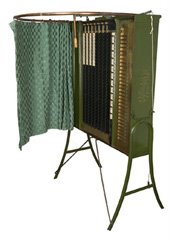
Okay, this might stir up a hornet's nest. But I don't care. When criticism of E-voting comes up, particularly Georgia's Diebold system, only one point of view seems to come up around the blogosphere. And some people simply accept it as truth without much evidence. But both sides should be represented. Discussion is healthy when all angles are viewed.
Conspiracy theories, I suppose, are fun to talk about. Sort of like small town or office gossip that caters to a not so lovely part of human nature. The part where people sometimes just like to believe the worst about others that they either don't like or don't really know. As Bookman points out, it becomes easy to do this in politics (on both sides) when things don't go your way.
Folks, I couldn't give a rat's furry hiney about Diebold or E-voting. They mean absolutely nothing to me. But I'll tell you what does mean something to me. And that's the fact that when people like Cynthia McKinney and her supporters go around hollering "vote-rigging," they're making a very convenient excuse for their lack of success at the polls. I don't care that it comes at the cost of Diebold. They can go fly a kite as far as I'm concerned. But what I do care about is the fact that when she does this, she's impugning the character of local election officials in the counties that encompass her district. The reason why is because neither Diebold nor the Secretary of State prepares these free-standing machines for elections.
Furthermore, I'd like to know where Cynthia was when in the 2000 general elections 94,000 Georgians didn't have their votes counted? Was that fair? Some people are acting as if voting was a bed of roses with lever machines (like the one above), paper ballots, punch card systems (need I say more?), and optical scan machines. For years people complained about sticky or hard to pull levers, voting machines that jammed, had to be closed without votes being counted, ballot box stuffing with paper, and punch card and O.S. machines where the stylus sometimes didn't punch through properly or the voter failed to darken in the oval next to a candidate's name. Unbelievably, we actually have anti-E-voting groups actually advocating returning to paper. Ask Jimmy Carter about paper ballots. Or better yet, read his book, Turning Point.
Local people, either employed in the election superintendent's office, or local computer pros (i.e. programmers, IT people) are hired by the election board to meet annual training requirements and perform setting functions and doing advertised and public logic and accuracy testing. Georgia law prescribes how machines are to be securely stored and access severely restricted. Failure to do these things results in jail time, not merely being fired. To "rig" an election, you can't do so without the knowledge or help from just one person, you need a lot of people - in each county. With thousands and thousands of units, can you imagine the number of people this would involve in Dekalb County alone? If Cynthia's got the proof, I'm all for seeing it, prosecuting those involved, and ensuring that it won't happen again. Lip service doesn't cut it for me.
It's so easy to indulge in conspiracy theories when you're talking about "they" as in "they did it." But the fact of the matter is "they" are real people with lives, jobs, and families. Are there people capable of doing such things? Of course there are. It's happened many times before using any and all kinds of equipment, most especially paper ballots. But even though it happens, it doesn't give anyone the excuse to make loose accusations. And of all people who have participated in elections using Georgia's new system, only one has cried foul, and that's Cynthia.
There have been lots of studies concerning either Georgia's system or equipment similar to Georgia's being used in other states that may or may not operate with the set of security laws that Georgia has in place. The most respected one seems to be the CalTech/MIT study in 2004 that named Georgia as the biggest improver in counting votes, going from 49th best to 2nd best. Others have been more critical. And I'm not about to argue that they don't have some merit. We've never had a perfect voting system, and I feel sure that we don't have one now. Like anything else electronic in our society, E-voting is generally regarded as a work in progress. And Diebold probably should have to reveal their source code. By not doing so, they make themselves look like greedy monopolists looking to take advantage of a new market, which they might well be. But when it comes to elections, the safety and security of our voting system is of the utmost importance.
Differing points of view are welcome here. I'm just saying lets lay it all out, not just one side of it. And I do so for the sake of the local folks that get thrown under the bus for the sake of something that, as it stands, is nothing more than a convenient conspiracy theory.
Okay, okay I'll shut up now. Here's Bookman's AJC article:
The lame vote-rigging cries return
Jay Bookman - Staff
Thursday, August 3, 2006
After night comes day and after spring comes summer, so I guess we all should have seen this one coming.
After U.S. Rep. Cynthia McKinney was forced into a surprising runoff in last month's Democratic primary, her campaign proposed a likely explanation: Electronic voting machines used in the election were made by Diebold.
"Team McKinney lawyers have affidavits from voters with complaints that they intended to vote for McKinney but that the machine switched their vote to one of her opponents," McKinney's campaign claimed on Election Day.
Which of course would explain everything.
The idea that electronic voting machines made by Diebold have been rigged by corporate and Republican interests to dictate the outcomes of elections has become a central unifying myth among a certain segment of the American left. Even before the election, McKinney was a champion of that far-fetched allegation, which helps to explain why that particular group treats her as a heroine. It also explains why it's no surprise that she has now raised allegations of vote-rigging to explain her own political problems.
For McKinney and her co-theorists around the country, Diebold has come to serve much the same function that the United Nations serves for their counterparts on the conspiratorial right. Both groups feel a strong but vague sense of being unfairly denied power, and of their country being taken away from them. Both are also eager to blame that powerlessness on something other than themselves, on some nefarious outside agency.
So, while one group complains about black helicopters, the other complains about what they call "black-box voting."
As the theories go, rigged Diebold machines supposedly caused the defeat of U.S. Sen. Max Cleland here in Georgia in 2002, and played a major role in the defeats of presidential candidates Al Gore and John Kerry against George W. Bush.
However, Cleland, Gore and Kerry have never given the allegations any credibility, and for good reason.
Generally, those making the allegations never offer any evidence or firsthand testimony that the voting machines were rigged or that results were actually altered; they offer, at best, evidence that the machines or their software could have been altered or that there were opportunities to do so.
And all too quickly, "possibly could have been rigged" becomes translated by some minds into "was rigged," and we're off to fantasyland.
Just this week, a lawsuit was filed in a California court seeking to overturn the results of a special election in June to fill a vacant congressional seat. (The seat was left open when the Republican incumbent, U.S. Rep. Randy "Duke" Cunningham, pleaded guilty to accepting bribes.)
Even though the district is heavily Republican, a Democratic candidate came close to winning the special election, which may bode poorly for the Republican Party come November. But there is no evidence that the California machines or voting results were altered in any way; the lawsuit --- filed by a lawyer from Washington state --- again merely claims that machines perhaps could have been altered, and on that basis it demands that the results be tossed out.
The truth is that if Republican leaders and their corporate sponsors could have rigged the voting in McKinney's race, they would have rigged it in her favor, so they could continue to portray her politics as the politics of the whole Democratic Party in Georgia.
And while some Republican voters may indeed show up to cast ballots against Mc-Kinney in the Democratic runoff Tuesday, Republican leaders in this state will privately be heartbroken if McKinney loses.
It's also telling to note that the person most responsible for bringing Diebold electronic voting to Georgia was Secretary of State Cathy Cox, who has defended the integrity of the machines as a vast improvement over the previous method of paper balloting, which they are. As a result, Cox has been accused of either being party to the vote-rigging or serving as a paid dupe of the company.
As it happens, Cox was on the same July 18 ballot as McKinney, in her case running for the Democratic nomination for governor. And what happened to the supposed darling of Diebold, in an election run on Diebold machinery?
Well, she lost.
> Jay Bookman is a deputy editorial editor. His column appears Thursdays and Mondays.
jbookman@ajc.com
http://www.ajc.com/thursday/content/epaper/editions/thursday/opinion_441da9d7f645319e000a.html


1 comment:
Diebold also makes night depositories for banks. You put your deposit in the receptacle and....omigod!....no paper trail!
The machine is probably doing something weird and conspiratorial with your deposits. Help! Help!
As a member of a board of elections, I have observed the steps that go into checking the voting machines before each election. Each of those machines gets checked so carefully that if you watched the whole process your eyes would eventually glaze over with sheer boredom. I mean, the checking is very very very extensive. Also voting machines are not on line and can't be affected by airplane flyovers or even close encounters with kryptonite. The conspiracy theorists need to go back to some of the more compelling areas of conjecture like UFOs and alchemy.
Post a Comment